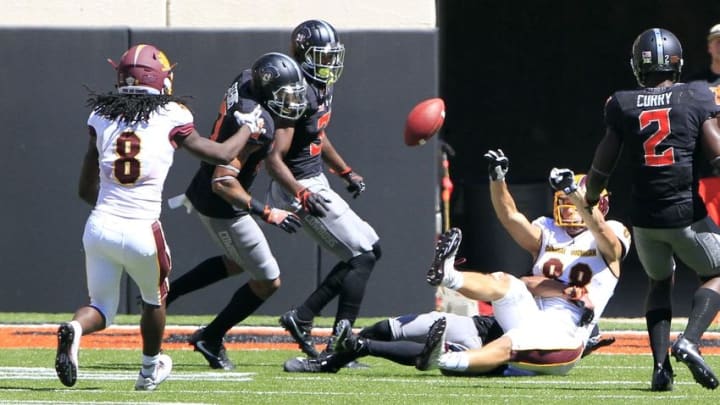Why Central Michigan Hail Mary Should Serve as Precedent for New Rule
By Zach Bigalke

Many have advocated reversing the Oklahoma State-Central Michigan result. Here’s why the “incorrect” call should become the new rule instead.
Central Michigan’s Hail Mary-lateral victory over Oklahoma State last Saturday ought to be remembered as an instant-classic moment in college football history. Instead, it has become a referendum on an obscure exception to the rule regarding penalties resulting in loss of down at the end of games.
The improbable finish upset win in Stillwater ostensibly should not have happened according to the way the rules are currently written. The officiating crew that worked the contest has been suspended for two weeks for botching the call at the end. And now calls have issued forth from across the country about the need to render justice and reverse the result in favor of Oklahoma State.
The rule in question relates to live ball fouls, which normally cannot end a game when committed by an offense. Yet there is a crafty little exception to the rule that effectively lets a team get away with one at the end of the game if the infraction includes loss of down. Here is the specific article in question:
"Rule 3, Section 2, Article 3.a.1 (Extension of Periods)A period shall be extended for an untimed down if one or more of the following occurs during a down in which time expires: (Exception: The period is not extended if the foul is by the team in possession and the statement of the penalty includes loss of down.)"
As written, Oklahoma State’s Mason Rudolph should have been allowed to get away with a clear-cut intentional grounding foul. Had the rule been applied “properly” the Cowboys would have effectively gotten away with a deliberate penalty to ice the game, and we never would have been treated to the Chippewas’ magic moment.
Amazingly, most of the hot takes that have come out in the aftermath of this game have been sympathetic only to Oklahoma State. The OSU student newspaper has questioned Central Michigan’s integrity over the result, issuing a demand to forfeit the victory. Sports-talk radio and studio shows have debated the merits of granting the NCAA power to review and reverse the result of games where a penalty is misapplied on the final play of the contest. All the talk has centered on the injustice of the rule application to the Cowboys and how it affects their season moving forward.
Crying foul over the misapplication of the rule as written, however, has caused many to miss a fundamental point. The correct application of the rule would have resulted in a gross dereliction of justice for the Chippewas. Had the home team gotten away with their final-play shenanigans, with Rudolph’s throw flagged but effectively consequence-free as the game concluded, Central Michigan would have been penalized instead of the Cowboys.
Related Story: Group of Five Week 2 Access Bowl Power Rankings
One must question the motives of those calling for a broad redefinition of the NCAA’s powers to retroactively rewrite the result of contests, rather than examining whether the rule in question should be revisited. It makes sense that the O’Colly in Stillwater would be up in arms about the final result. Why everyone else is seeking vengeance against the Chippewas, though, is unfathomable aside from inherent biases against Group of Five schools.
Usually the country loves an underdog story, but for some reason all the vitriol has been directed toward David rather than Goliath in this instance.
More from College Football News
- Michigan State vs. Maryland: Location, time, prediction, and more
- Ranking college football’s top 10 quarterbacks after Week 3
- Things are going to get much darker for the Houston Cougars
- Biggest winners and losers from College Football Week 3
- #10 Alabama football: 3 takeaways from close road win against USF
Remember, the game didn’t have to end this way. Oklahoma State’s defense had ample opportunity to prevent CMU quarterback Cooper Rush from stepping up in the pocket and hitting receiver Jesse Kroll more than 40 yards downfield. The Cowboys had plenty of guys standing around the play as Kroll lateraled back to Corey Willis. Had any one of the Pokes defenders simply done their job and brought down any one of these individuals before the goal line, the result would have gone exactly as OSU fans wished.
The letter of the law might say that the OSU defense shouldn’t have to try to make the stop. The spirit of that rule, however, is unjustly flawed and gives teams the incentive to take a consequence-free penalty to save a victory.
The officials might be suspended, but their interpretation of the rule should become the new precedent. Rather than the calls to grant greater latitude to retroactively rewrite scores, we should want results to be decided on the field. The rule penalizing end-of-game live ball fouls should be rewritten to ensure the opportunity to see more final plays like Central Michigan gave the country, rather than permitting unsporting final plays like Oklahoma State tried to offer.